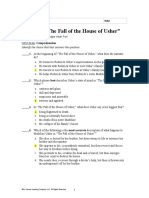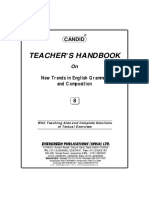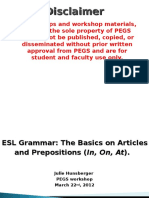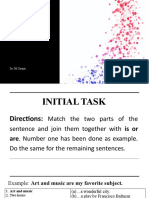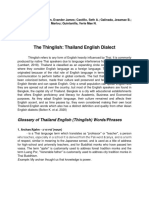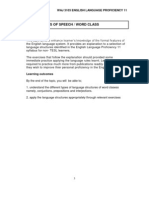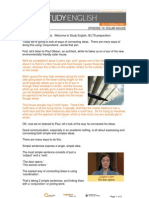A/an, Remember That The Belongs To: Page 1 of 3
A/an, Remember That The Belongs To: Page 1 of 3
Uploaded by
Milton MotoCopyright:
Available Formats
A/an, Remember That The Belongs To: Page 1 of 3
A/an, Remember That The Belongs To: Page 1 of 3
Uploaded by
Milton MotoOriginal Title
Copyright
Available Formats
Share this document
Did you find this document useful?
Is this content inappropriate?
Copyright:
Available Formats
A/an, Remember That The Belongs To: Page 1 of 3
A/an, Remember That The Belongs To: Page 1 of 3
Uploaded by
Milton MotoCopyright:
Available Formats
STUDY NOTES DEFINITE AND INDEFINITE ARTICLES English uses articles to provide information about a noun, whether it is generic,
indefinite or definite. Choosing the appropriate article can be confusing and difficult, especially for those language learners whose native languages do not differentiate between definite and indefinite articles. These notes cover most of the difficult situations.
EPISODE 13: UNDER THE SEA STUDY TIPS To remind you when to use the or a/an, remember that the belongs to the group of th words this/these, that/those and refers to a particular or definite person, place or thing. a/an belongs to the words meaning one and means an example of one of something.
In English there are two types of articles - indefinite and definite. Indefinite: a, an a used with words and abbreviations that begin with a consonant, for example a pear, a DVD an used with words and abbreviations that begin with a vowel, for example an apple, an ATM the
Definite:
No article required: no article ( ). Generic nouns and articles: a, an or no article ( ). A generic noun is used for a non-specific reference, making a generalization about a whole group of people, objects, places or things. It is a kind of symbol that represents all or any member of an entire group. USE Nouns countable Singular a, an A chocolate is sweet and hard. Meaning: not one actual chocolate but any one chocolate that represents all others Chocolate is a nice dessert. Meaning: all chocolate, generally Plural no article ( ) Chocolates are delicious. Meaning: all chocolates are delicious
uncountable
Page 1 of 3
Indefinite nouns and articles: a and an An indefinite noun is used to name real people, places or things, but the reference is unspecified. Indefinite articles are used with singular countable nouns. SINGULAR COUNTABLE NOUNS Use 1. to introduce an unknown person, place or thing into the text for the first time 2. when the person or thing does not refer to someone or something specifically 3. when making reference to a persons job or a member of a group 4. when giving a definition 5. in set phrases: a few, a little, a bottle of, a kilo, a dozen, a lot of etc. EXAMPLE I bought a paper from the newsagent on the corner. It had an article about the drought. He took a notebook to class. He is a teacher. She is an Australian. The shark is a carnivorous animal. Only a few students attended the workshop on the weekend.
Definite nouns and articles: the A definite noun is used when naming a person, place or thing specifically. DEFINITE NOUNS: THE Use 1. when the reference to the person or thing is known 2. when it refers to something unique 3. when the noun has been referred to before 4. when referring to someones job title 5. with a superlative adjective 6. with time periods 7. with proper nouns that have an of phrase 8. with some geographic names, specifically referring to a group 9. with names of oceans, seas and rivers 10. with regions 11. with names of government departments, organisations 12. with adjectives naming the nationality of a people EXAMPLE The teacher marked our essays in class. Part time English students are entitled to use the library facilities. The sun was bright and almost orange. They chose a school close to the city. The school has an excellent reputation. the chief executive officer Susan got the highest mark in the listening test. the twenty-first century, the winter, the spring, in the morning, the future the University of Technology the Netherlands, the Philippines, the United Kingdom, the Himalayas the Nile, the Yangtze, the Atlantic (Ocean), the Red Sea the West, the South Pole, the Equator the Department of Foreign Affairs, the United Nations the Australians, the Thais
Page 2 of 3
Pronunciation of Articles the is pronounced // in front of words beginning with a consonant, for example the Thais / 'taz/. the is pronounced /i / in front of words beginning with a vowel, for example the Australians /i j s'treljn/; when linking between two vowels a /w/ or /j/ sound is inserted. when stressing the to emphasis the word following, the pronunciation is always /i / even before a consonant, for example The man shouted to the boys, Put it on the floor, not the table. Practise saying these phrases emphasising the and then NOT emphasising it. the Antarctic expedition /i j n'taktk ksp'dn/ vs the Antarctic expedition / j n'taktk ksp'dn/
when stressing a to emphasise the word following, the pronunciation is always /e /, even before a consonant, for example Practise emphasising a and then NOT emphasising it in these phrases. a computer lab tutorial /e km'pjut lb tju'tril/ vs vs a computer lab tutorial / km'pjut lb tju'tril/
when a word begins with a silent h, an an is used before the word, for example an hour (h is silent) /n 'a/ compare: a harbour / 'hab/
Page 3 of 3
You might also like
- The House of Usher QuizDocument9 pagesThe House of Usher Quizomar deeb60% (10)
- Lester & Clyde ES1Document20 pagesLester & Clyde ES1S TANCRED100% (2)
- Level B1 Word ListDocument894 pagesLevel B1 Word ListAINNo ratings yet
- Pamphlet of Uncommon Ancestry by Benjamin Huffman v1Document15 pagesPamphlet of Uncommon Ancestry by Benjamin Huffman v1vaffle100% (2)
- Aspiration PronunciationDocument3 pagesAspiration PronunciationElsa Vargas Monter100% (1)
- Candid Class 8 ECGDocument61 pagesCandid Class 8 ECGArkajit Chowdhury75% (4)
- Mastering English Articles A, AN, and THE: Learn to Use English Articles Correctly in Every English Sentence!From EverandMastering English Articles A, AN, and THE: Learn to Use English Articles Correctly in Every English Sentence!Rating: 4 out of 5 stars4/5 (3)
- Structural Symbol in Joyce S The DeadDocument12 pagesStructural Symbol in Joyce S The DeadAri AnaNo ratings yet
- Armies of NorscaDocument102 pagesArmies of Norscalastedition75% (4)
- A/an, Remember That The Belongs To: Page 1 of 3Document0 pagesA/an, Remember That The Belongs To: Page 1 of 3Saurabh MeenaNo ratings yet
- ArticlesDocument34 pagesArticlessong si wonNo ratings yet
- ENG 111 (CIS) - 1.1. ArticleDocument18 pagesENG 111 (CIS) - 1.1. Articlefardinalrafi50No ratings yet
- English GrammarDocument42 pagesEnglish Grammaralbadreamz100% (1)
- Orthography: As Outlined in the State Course of Study for IllinoisFrom EverandOrthography: As Outlined in the State Course of Study for IllinoisNo ratings yet
- Module 4 - TesolDocument12 pagesModule 4 - TesoldindoNo ratings yet
- English BookDocument121 pagesEnglish BookRaaghul RaviNo ratings yet
- How To Improve Speaking English ReportDocument29 pagesHow To Improve Speaking English ReportHoney Grace LledoNo ratings yet
- First Language English, Semester 1, Week 19 - 15.37.51Document19 pagesFirst Language English, Semester 1, Week 19 - 15.37.51luluamurtazakarimiNo ratings yet
- GrammarDocument47 pagesGrammarHamimah Nasution IsmailNo ratings yet
- Chapter I I Am From Mexico.: Noun Building Blocks of LanguageDocument1 pageChapter I I Am From Mexico.: Noun Building Blocks of LanguagePhay XayavongNo ratings yet
- Detailed Lesson Plan in English Grade 8: Lawang Bato National High SchoolDocument6 pagesDetailed Lesson Plan in English Grade 8: Lawang Bato National High SchoolMar ClarkNo ratings yet
- GR N Voc 7Document7 pagesGR N Voc 7K PrasadNo ratings yet
- Orthography: PrefaceDocument93 pagesOrthography: PrefaceGutenberg.orgNo ratings yet
- Describing People - Lesson PlanDocument9 pagesDescribing People - Lesson PlanSalhatulnajmi OmarNo ratings yet
- Articles by Rays English Private SchoolDocument13 pagesArticles by Rays English Private SchoolAbdi fatah BashirNo ratings yet
- Building VocabularyDocument13 pagesBuilding VocabularyCarolina Garzón BeltránNo ratings yet
- GNS 314 - (Comprehensive Note Till Direct and Indirect Speech)Document13 pagesGNS 314 - (Comprehensive Note Till Direct and Indirect Speech)Bn SulaimanNo ratings yet
- JS2 English FTDocument14 pagesJS2 English FTlordiwegbuNo ratings yet
- We Usually Use No Article To Talk About Things in General - The Doesn't Mean AllDocument13 pagesWe Usually Use No Article To Talk About Things in General - The Doesn't Mean Allulink leeNo ratings yet
- ConclusionDocument6 pagesConclusionYolany R. YanezNo ratings yet
- W3 Lesson Only 2Document27 pagesW3 Lesson Only 2Miya Chocho XDNo ratings yet
- Week 5 Subject Verb AgreementDocument41 pagesWeek 5 Subject Verb AgreementreeseNo ratings yet
- English ScrapbookDocument27 pagesEnglish ScrapbookaydenadamlelamuradNo ratings yet
- Efl2 TeacherDocument9 pagesEfl2 TeacherDiego Alexander Becerra BalagueraNo ratings yet
- Units 65,66,69,70Document31 pagesUnits 65,66,69,70saratorabianNo ratings yet
- The Eight Parts of Speech in English (PDF) ?Document5 pagesThe Eight Parts of Speech in English (PDF) ?JeronimoNo ratings yet
- GrammarDocument23 pagesGrammarNavido AhmadiNo ratings yet
- Grammar SheetsDocument68 pagesGrammar SheetsGladys Mallma GomezNo ratings yet
- Safari - Nov 8, 2020 at 9:47 PM PDFDocument1 pageSafari - Nov 8, 2020 at 9:47 PM PDFShafi sediqiNo ratings yet
- GuidebookDocument41 pagesGuidebookdylandavid987No ratings yet
- Thailand English Dialect Group 2 Baludi Bahian Castillo Galinada Oponda Porras QuintanillaDocument8 pagesThailand English Dialect Group 2 Baludi Bahian Castillo Galinada Oponda Porras QuintanillaAisa BaludiNo ratings yet
- Overview of EnglishDocument5 pagesOverview of EnglishleslyjanedpomoyNo ratings yet
- Andrusiak I.V. The Use of Articles in EnglishDocument66 pagesAndrusiak I.V. The Use of Articles in EnglishКсенія Клименко (Амп13)No ratings yet
- Andrusiak I.V. The Use of Articles in EnglishDocument66 pagesAndrusiak I.V. The Use of Articles in EnglishПоліна Олександрівна МасловськаNo ratings yet
- Term 1 LanguageDocument39 pagesTerm 1 Languagezynnie955No ratings yet
- ESEN Module 3 - CP1&2 ReviewerDocument17 pagesESEN Module 3 - CP1&2 ReviewerMarites J. CarlosNo ratings yet
- HandoutDocument8 pagesHandoutaxelgiovanniNo ratings yet
- Phonics PDFDocument22 pagesPhonics PDFIrfatnaz ShaikhNo ratings yet
- Strategies For Improving PronunciationDocument6 pagesStrategies For Improving PronunciationChing ChingNo ratings yet
- Activity GSP Formal Informal Language and GrammarDocument2 pagesActivity GSP Formal Informal Language and Grammarvellingiri2008No ratings yet
- Guidebook (Recuperado)Document44 pagesGuidebook (Recuperado)dylandavid987No ratings yet
- Grammar & StructuresDocument34 pagesGrammar & StructuresmaharaniayulestariNo ratings yet
- Subject Verb AgreementDocument5 pagesSubject Verb AgreementSasmita TarihoranNo ratings yet
- How Do You Say It in EnglishDocument51 pagesHow Do You Say It in EnglishJeannete Atim100% (3)
- Subject Verb AgreementDocument7 pagesSubject Verb AgreementJorge MolinaNo ratings yet
- Topic 1 2 and 3 Waj 3103 Eng Lang Profi PPGDocument56 pagesTopic 1 2 and 3 Waj 3103 Eng Lang Profi PPGMHD AMIN OMARNo ratings yet
- Focus On The LearnerDocument7 pagesFocus On The LearnerDiana Graur100% (2)
- Contextclues 240115051544 Eb0b1365Document40 pagesContextclues 240115051544 Eb0b1365502321No ratings yet
- Orthography As Outlined in the State Course of Study for IllinoisFrom EverandOrthography As Outlined in the State Course of Study for IllinoisNo ratings yet
- Webster's Word Power Essential English Words: Learners' DictionaryFrom EverandWebster's Word Power Essential English Words: Learners' DictionaryNo ratings yet
- The Briefest English Grammar and Punctuation Guide Ever!From EverandThe Briefest English Grammar and Punctuation Guide Ever!Rating: 5 out of 5 stars5/5 (5)
- First Lessons in the Maori Language, with a Short VocabularyFrom EverandFirst Lessons in the Maori Language, with a Short VocabularyNo ratings yet
- Numbers, Numerals and Digits: SayingDocument12 pagesNumbers, Numerals and Digits: SayingMilton MotoNo ratings yet
- Answers A. B. C.: Page 1 of 4Document4 pagesAnswers A. B. C.: Page 1 of 4Milton MotoNo ratings yet
- s2005 TranscriptDocument5 pagess2005 TranscriptMilton MotoNo ratings yet
- s1016 TranscriptDocument5 pagess1016 TranscriptMilton MotoNo ratings yet
- Activity Sheet Episode 7: The Speaking TestDocument5 pagesActivity Sheet Episode 7: The Speaking TestMilton MotoNo ratings yet
- s1021 TranscriptDocument6 pagess1021 TranscriptMilton MotoNo ratings yet
- s1008 ActivitiesDocument4 pagess1008 ActivitiesMilton MotoNo ratings yet
- Transcript Episode 4Document5 pagesTranscript Episode 4Milton MotoNo ratings yet
- Activity Sheet Episode 18: Labelling and Describing An ObjectDocument4 pagesActivity Sheet Episode 18: Labelling and Describing An ObjectMilton MotoNo ratings yet
- s1010 TranscriptDocument5 pagess1010 TranscriptMilton MotoNo ratings yet
- Contractions in Informal English: They're Where's Here'sDocument6 pagesContractions in Informal English: They're Where's Here'sMilton MotoNo ratings yet
- Transcript Episode 10: Vocabulary For SpeakingDocument4 pagesTranscript Episode 10: Vocabulary For SpeakingMilton MotoNo ratings yet
- Study Notes Episode 5: Global WarmingDocument3 pagesStudy Notes Episode 5: Global WarmingMilton MotoNo ratings yet
- Fluency in Spoken English: Page 1 of 4Document5 pagesFluency in Spoken English: Page 1 of 4Milton MotoNo ratings yet
- Purpose Statement: Page 1 of 8Document8 pagesPurpose Statement: Page 1 of 8Milton MotoNo ratings yet
- s2013 TranscriptDocument5 pagess2013 TranscriptMilton MotoNo ratings yet
- s1020 TranscriptDocument5 pagess1020 TranscriptMilton MotoNo ratings yet
- s1023 NotesDocument2 pagess1023 NotesMilton MotoNo ratings yet
- Activity Sheet Episode 21: Talking About FamiliesDocument3 pagesActivity Sheet Episode 21: Talking About FamiliesMilton MotoNo ratings yet
- Recounting The Past: Page 1 of 3Document3 pagesRecounting The Past: Page 1 of 3Milton MotoNo ratings yet
- s2024 ActivitiesDocument4 pagess2024 ActivitiesMilton MotoNo ratings yet
- Activity Sheet Episode 8: Speaking FluentlyDocument3 pagesActivity Sheet Episode 8: Speaking FluentlyMilton MotoNo ratings yet
- Ielts Reading Skills and Strategies: Page 1 of 8Document8 pagesIelts Reading Skills and Strategies: Page 1 of 8Milton MotoNo ratings yet
- s1024 ActivitiesDocument5 pagess1024 ActivitiesMilton MotoNo ratings yet
- Infinitive Verb Functions: To Forgive Is Divine, So As To ReduceDocument3 pagesInfinitive Verb Functions: To Forgive Is Divine, So As To ReduceMilton MotoNo ratings yet
- Capital Letters: Page 1 of 2Document2 pagesCapital Letters: Page 1 of 2Milton MotoNo ratings yet
- Descriptions Adjectives: Page 1 of 5Document5 pagesDescriptions Adjectives: Page 1 of 5Milton MotoNo ratings yet
- s2011 ActivitiesDocument4 pagess2011 ActivitiesMilton MotoNo ratings yet
- Answering Questions About The FamilyDocument7 pagesAnswering Questions About The FamilyMilton MotoNo ratings yet
- Transcript Episode 21: Talking About The Family: Page 1 of 4Document4 pagesTranscript Episode 21: Talking About The Family: Page 1 of 4Milton MotoNo ratings yet
- Webber KierkegaardElaborationUnamunos 1964Document18 pagesWebber KierkegaardElaborationUnamunos 1964deigoNo ratings yet
- Personality Adjectives: A) Match The Words With The Definitions and The PicturesDocument2 pagesPersonality Adjectives: A) Match The Words With The Definitions and The PicturessriNo ratings yet
- Jane Austen and Pride and PrejudiceDocument7 pagesJane Austen and Pride and PrejudiceDaniela VSNo ratings yet
- Chapter 30 Reading Sample AnswersDocument3 pagesChapter 30 Reading Sample AnswersHollyNo ratings yet
- Bagong Bayan, City of Malolos, Bulacan: Marcelo H. Del Pilar National High SchoolDocument3 pagesBagong Bayan, City of Malolos, Bulacan: Marcelo H. Del Pilar National High SchoolCarl Lawrence R. CarpioNo ratings yet
- Grimoire Compiled - 8 - 14 - 18Document51 pagesGrimoire Compiled - 8 - 14 - 18Urias SantosNo ratings yet
- Inheritance of Loss EssayDocument2 pagesInheritance of Loss Essayshreya snehaNo ratings yet
- Thorough Analysis and Response Essay OnDocument8 pagesThorough Analysis and Response Essay OnRahmoun OmarNo ratings yet
- Summer SolsticeDocument9 pagesSummer SolsticeKristell C. LagardeNo ratings yet
- GS ListGame 29 04 2017Document561 pagesGS ListGame 29 04 2017XYZ DistributionNo ratings yet
- Nomenclature in Hard TimesDocument3 pagesNomenclature in Hard TimesJalal Nasser SalmanNo ratings yet
- Devoir de Synthèse N°2 - Anglais - 2ème Sciences (2011-2012) Mlle Chabchoub Rafiaa PDFDocument3 pagesDevoir de Synthèse N°2 - Anglais - 2ème Sciences (2011-2012) Mlle Chabchoub Rafiaa PDFAbderahmen Haj DahmenNo ratings yet
- Information Systems Strategy and Services INFO3426 Assignment 2007-2008 Management Report On IT ServicesDocument6 pagesInformation Systems Strategy and Services INFO3426 Assignment 2007-2008 Management Report On IT ServicesCườngPhanTháiNo ratings yet
- KenFollett Masterclass - Keep Me in Suspense - Learning From The MastersDocument4 pagesKenFollett Masterclass - Keep Me in Suspense - Learning From The Masterslord_horn_asstrNo ratings yet
- Huxley To Orwell: My Hellish Vision of The Future Is Better Than Yours (1949)Document2 pagesHuxley To Orwell: My Hellish Vision of The Future Is Better Than Yours (1949)Maria Paraschiv100% (1)
- The Giving TreeDocument3 pagesThe Giving TreeFRANCES NIGELINA LEE Moe100% (1)
- Waiting For GodotDocument24 pagesWaiting For GodotPetraru Olaru NiculinaNo ratings yet
- David T. Johnson - Richard Linklater (Contemporary Film Directors)Document202 pagesDavid T. Johnson - Richard Linklater (Contemporary Film Directors)Jp Vieyra Rdz100% (1)
- A Simple Magic SystemDocument15 pagesA Simple Magic SystemFelipe CamposNo ratings yet
- Kertas 2 SPMDocument7 pagesKertas 2 SPMazrulNo ratings yet
- 08 Chapter 2Document18 pages08 Chapter 2SanjayMeena0% (1)
- The Arrival PDFDocument4 pagesThe Arrival PDFtalitha_aluviel100% (3)
- Kratke PričeDocument11 pagesKratke PričeDajana NovakNo ratings yet
- The Last Man Is A Science Fiction Story of 1829, Written by Mary Shelly. The MainDocument3 pagesThe Last Man Is A Science Fiction Story of 1829, Written by Mary Shelly. The MainfreeditorialNo ratings yet
- 99 Compliments For KidsDocument1 page99 Compliments For KidsIra EridaniNo ratings yet
- Brontë SistersDocument6 pagesBrontë SistersОлександр АнікінNo ratings yet
